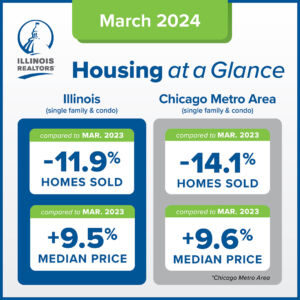Legal Case Studies: Real estate broker awarded compensation based on work performed
Legal case studies this issue: Real estate broker awarded compensation based on work performed; franchisor held not liable for franchisee’s embezzlement of escrow deposit; Fair Housing Act suit alleging sexual orientation discrimination against owner/landlord of senior living facility allowed to proceed; homeowners lacked standing under annexation agreement to sue developer and village for faulty storm sewers; plaintiff could not recover for injury caused by falling while trying to walk through an open and obvious pile of snow on a private sidewalk.
Research and analysis by Lisa Harms Hartzler,
Sorling Northrup Attorneys
Real estate broker awarded compensation based on work performed
In Jameson Real Estate, LLC v. Ahmed, 2018 IL App (1st)171534, a real estate broker specializing in off-market property sought to purchase a car wash and its underlying real estate, which were owned by two different companies. The broker initially attempted to make the purchases individually but realized he needed to partner with an expert in the car wash business. Another person in the broker’s firm introduced him to the defendant, who agreed to sign a confidentiality agreement with the broker in order to receive information about the business and property. The broker ultimately decided he should not proceed individually and thought he had an agreement with the defendant to be paid a broker’s commission if the defendant bought the car wash or the real estate; however, nothing about a commission was in writing. The defendant later informed the broker that he had decided against the purchase. Later, the property owner acquired the car wash assets in a bankruptcy foreclosure and contacted the defendant to negotiate a sale of both the assets and the property. The defendant bought the real estate for $2.3 million but did not pay the broker or his employer a commission.
The broker sued the defendant for compensation under a theory of quantum meruit, which means “as much as he deserves.” This cause of action seeks recovery for the reasonable value of services nongratuitously rendered but where no contract exists to dictate payment. To recover under a quantum meruit theory, a plaintiff must prove that (1) he performed a service to the benefit of the defendant; (2) he did not perform the service gratuitously; (3) the defendant accepted this service; and (4) no written contract existed to prescribe payment for this service. A broker who is the procuring cause of a sale is entitled to a commission under a quantum meruit theory. The court stated, “When a broker provides real estate brokerage services to a purchaser, the broker should not be deprived of commission merely because the purchaser completed the sale without the broker’s direct involvement, when the broker introduced the parties of the sale and the purchaser ‘admittedly would never have known about the existence of the property’ without the broker’s efforts.”
In this case, the court found that the defendant was introduced to the seller by the broker and would not have known about the property but for the broker’s efforts. It affirmed an award to the broker’s employer of $50,000, which testimony supported was approximately half of the standard five percent commission typically split between purchaser’s and seller’s brokers.
Franchisor held not liable for franchisee’s embezzlement of escrow deposit.
In New Star Realty, Inc. v. Jungang PRI USA, LLC, 346 Ga. App. 548 (2018), an investment company, Jungang, argued that a California franchisor, New Star Realty (New Star California), was vicariously liable, in part, under an actual agency theory for the acts of its franchisee, New Star Realty & Investment (New Star Georgia), whose principal stole Jungang’s $1 million escrow deposit for a real estate purchase. New Star Georgia’s principal was able to steal the escrow deposit because the company’s agent in charge of escrows did not review escrow accounts, was not a required signor of withdrawals from the accounts and did not implement any policies or procedures to secure those accounts.
The Georgia appellate court noted that a franchisor is faced with a delicate balance “of exercising sufficient control over a franchisee to protect its national identity and professional reputation, while at the same time foregoing such a degree of control that would make it vicariously liable for the acts of the franchisee and its employees.” It further found that “a franchisee may protect its franchise and its trade name by setting standards governing its franchisee’s operations, and these standards may be quite detailed, specific, and strict.” In this case, New Star California protected its brand name, logo and proprietary business systems licensed exclusively to New Star Georgia with detailed requirements, but it did not have “day-to-day supervisory control” or involvement in daily operations. Consequently, Jungang could not support its claim that New Star Georgia was an actual agent of New Star California. The franchisor, therefore, was not responsible for the franchisee’s theft of the escrow deposit.
Fair Housing Act suit alleging sexual orientation discrimination against owner/landlord of senior living facility allowed to proceed.
In Wetzel v. Glen St. Andrew Living Community, LLC, — F.3d – (7th Cir. 2018) (No. 171322, decided Aug. 27, 2018), an openly lesbian resident of St. Andrew’s senior living facility alleged that individuals managing the facility and the owner violated Fair Housing Act section 3604(b), which makes it unlawful to discriminate because of sex, and section 3617, which forbids a housing provider to interfere with any person in the exercise or enjoyment of any right granted or protected by section 3604. The plaintiff alleged that within months of moving into St. Andrew’s she suffered a torrent of physical and verbal abuse from other residents, which the court described as severe and pervasive. When she implored the St. Andrew’s staff for help, their response was to limit her use of facilities, physically abuse her, and build a case for her eviction.
The Seventh Circuit Court of Appeals first explained that sections 3604 and 3617 prohibit the kind of post-acquisition discrimination the plaintiff suffered, which it called a “hostile housing environment.” The plaintiff adequately alleged that she endured unwelcome harassment based on a protected characteristic because of her sex, which includes sexual orientation. Further, because she was unable to use common areas and eat the three meals a day her residential lease provided for, the harassment interfered with the terms, conditions, or privileges of her residency, or in the provision to her of service or facilities.
The novel question for the court was whether there was a basis for imputing liability to defendant St. Andrew’s. On its face the Fair Housing Act does not address who may be liable when sex-based discrimination occurs or under what circumstances. It does not spell out a test for landlord liability.
To resolve this question, the court looked to the analogous anti-discrimination statutes of Title VII (employment) and Title IX (education) and concluded that the Supreme Court’s interpretations of the similar language in those statutes should also be applied to the Fair Housing Act. It held that an organization, including a landlord, could be held accountable for its own misconduct. If management had actual knowledge of the severe harassment plaintiff was enduring and was deliberately indifferent to it, such conduct was forbidden by the Fair Housing Act. The court stated that the duty not to discriminate in housing conditions encompasses the duty not to permit known harassment on protected grounds. A landlord has responsibility over the common areas, where the majority of the plaintiff’s harassment took place and it was exercising its right to enter her apartment when incidents perpetrated by the staff were alleged to occur.
The court noted that St. Andrew’s had an “arsenal of incentives and sanctions” that it could have used to remedy the harassment the plaintiff allegedly suffered by her fellow tenants. Under its residency agreements, it could have evicted any tenant who engaged in acts constituting a direct threat to the health and safety of others or who unreasonably interfered with the peaceful use and enjoyment of the community by other tenants. It could have updated its Tenant Handbook to clarify anti-harassment provisions. It could have suspended common area privileges for tenants violating its policies.
The court reversed the district court’s dismissal of the case and remanded it for further proceedings.
Homeowners lacked standing under annexation agreement to sue developer and village for faulty storm sewers.
In Doyle v. Village of Tinley Park, 2018 IL App (1st) 170357, developer Malone entered into a 1990 annexation agreement with the Village of Tinley Park in which he agreed to design and construct storm sewers so that the proposed new subdivision’s storm water runoff would be retained within a central detention system. Plaintiffs contracted with Malone in 2004 to build a house in the subdivision. Plaintiffs began to notice overactivity by their sump pump during rain or heavy snowfall.
By 2010, there was serious erosion around the storm drain on the west side of the house, the surrounding dirt had caved in, and the ground in the area had dropped by several feet. Plaintiffs complained to the Village, which sent out work crews several times to add soil and rock, but the problem was not fixed. Later in the year, the plaintiffs also detected structural damage to their home. The village determined in 2011 that the storm pipe was leaking and solicited bids for repair, but still the problem remained unresolved. The village finally determined that a different pipe under the street was also leaking and hired a second contractor to repair it.
Plaintiffs sued Malone to recover for the structural damage to their house, claiming that Malone breached his annexation agreement with the village to provide adequate storm sewers. Plaintiffs alleged that they were successors in interest to that agreement. They also sued the village for negligently failing to deal with the drainage problem in a timely or appropriate manner, which exacerbated the damage to their home. Malone and the village both moved to dismiss the case, which was granted by the trial court.
On appeal, the court held that the plaintiffs did not have standing to sue Malone under the annexation agreement. By its terms and under the Municipal Code, that agreement was binding on the successors and assigns of the “subject property.” The court interpreted that phrase to mean a successor to the whole property that was subdivided, not each individual lot purchaser who bought a portion of it. Had the agreement intended to extend to individual lot owners, it would have said it was binding on successors of the subject property or any part thereof. Further, even if the plaintiffs could step into the shoes of one of the party’s interests, that party would have been Malone but, obviously, they could not sue themselves for breach of contract. The court affirmed dismissal of the suit against Malone.
The court also affirmed dismissal against the village under the Illinois Local Governmental and Governmental Employees Tort Immunity Act. That statute grants immunity from tort liability to municipal employees “serving in a position involving the determination of policy or the exercise of discretion” for their actions “in determining policy when acting in the exercise of such discretion.” In this case, the court found that the village employees had to balance the lack of funds and manpower with the need to make the storm sewer investigations and repairs. The decisions on whether, when and how to balance those considerations involved policymaking and discretion, which were protected from the plaintiffs’ negligence allegations.
Plaintiff could not recover for injury caused by falling while trying to walk through an open and obvious pile of snow on a private sidewalk.
In Winters v. MIMG LII Arbors at Eastland, LLC, 2018 IL App (4th) 170669, an apartment complex tenant sued the property owner and the company contracted to remove snow from the parking lot for negligence in leaving a large pile of snow on the sidewalk. Because so much snow had fallen in January, the snow removal contractor had no more room for snow in the designated areas and proceeded to push a large pile onto the sidewalk. The mound of snow was so large and hard, the property owner’s maintenance crew could not remove it with snow blowers. The tenant, while holding a full laundry basket, walked outside of his building to an adjacent building containing laundry facilities. He noticed the pile of snow. There were other, although less direct, routes he could have taken to reach the laundry room. Nevertheless, he proceeded to traverse the snow pile through a path that other walkers had forged through it. He fell and broke his ankle.
The plaintiff contended that the defendant property owner and snow removal company had a duty to exercise reasonable care to remove the snow. The defendants responded that the pile was “open and obvious” and that, therefore, no duty existed. The Illinois appellate court stated that four factors determine whether a duty exists: 1) the likelihood of injury; (2) the reasonable foreseeability of the injury; (3) the magnitude of the burden of guarding against the injury; and (4) the consequences of placing that burden on the defendant. The “open and obvious” doctrine affects the first and second duty factors. A condition on the land is “open and obvious” when a reasonable person in the plaintiff’s position, exercising ordinary perception, intelligence, and judgment, would recognize both the condition and the risk involved. In this case, the court held that the pile of snow was “open and obvious” as a matter of law, that the plaintiff testified that his visibility was not obstructed, that he was aware of the pile of snow, and that a reasonable person would have realized the risk of walking on it. The defendants owed no duty to the plaintiff.
The plaintiff argued that the “deliberate encounter” exception applied in this case. That exception applies when a land owner has reason to expect that an invitee or licensee will proceed to encounter a known or obvious danger because a reasonable person in plaintiff’s position would do so. Because there were alternative routes to the laundry room that a reasonable person would have used, the court held that the “deliberate encounter” exception was not applicable. It affirmed summary judgment for the defendants.
About the writer: Lisa Harms Hartzler is Of Counsel at Sorling Northrup Attorneys in Springfield. She graduated from the American University Washington College of Law in 1978 and began her legal career in Chicago. She has provided legal support for the Illinois REALTORS’ local governmental affairs program since she joined Sorling in 2006 and focuses her practice on municipal law, general corporate issues, not-for-profit health care law, and litigation support.





 Create professional development programs that help REALTORS® strengthen their businesses.
Create professional development programs that help REALTORS® strengthen their businesses.
 Protect private property rights and promote the value of REALTORS®.
Protect private property rights and promote the value of REALTORS®.
 Advance ethics enforcement programs that increase REALTOR® professionalism.
Advance ethics enforcement programs that increase REALTOR® professionalism.
 Protect REALTORS® by providing legal guidance and education.
Protect REALTORS® by providing legal guidance and education. Stay current on industry issues with daily news from Illinois REALTORS®, network with other professionals, attend a seminar, and keep up with industry trends through events throughout the year.
Stay current on industry issues with daily news from Illinois REALTORS®, network with other professionals, attend a seminar, and keep up with industry trends through events throughout the year.


